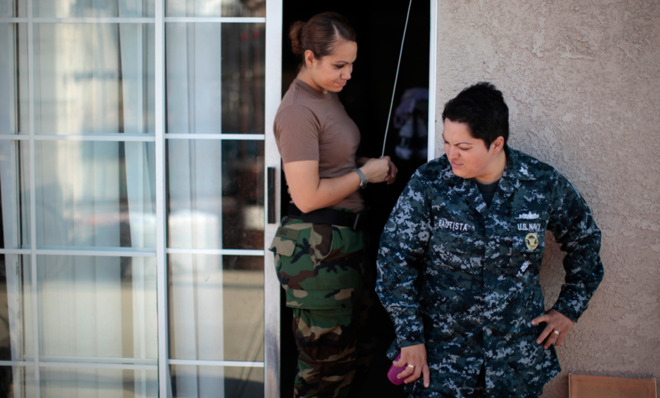How the VA is leading the way on LGBT patient care
Since the repeal of "Don't Ask, Don't Tell," the Department of Veterans Affairs has been a trailblazer in an area that has historically bedeviled the LGBT community

A free daily email with the biggest news stories of the day – and the best features from TheWeek.com
You are now subscribed
Your newsletter sign-up was successful
Along with the growing acceptance of gay marriage, the repeal of "Don't Ask, Don't Tell" — the policy that prevented gays and lesbians from serving openly in the military — has been a central part of the LGBT community's fight for equality. Since DADT's repeal, the military has surprised us all. It surprised the far right by demonstrating that the military didn't implode. It surprised most everyone else by recognizing same-sex partners nearly a year before the federal government did.
What is less known, however, is that the Veterans Health Administration (VHA), a branch of the Department of Veterans Affairs, is also at the vanguard of providing inclusive patient care for LGBT veterans and their families.
This is an important development. For much of modern history, the U.S. medical community has been at odds with the LGBT community. Social prejudices seeped into patient care through physicians, nurses, and hospital staff, and shaped medicine's attitudes towards matters of sexual orientation and gender identity. Indeed, many of the prejudices that still face the LGBT community arguably stemmed from early decisions made by medical professionals and researchers.
The Week
Escape your echo chamber. Get the facts behind the news, plus analysis from multiple perspectives.

Sign up for The Week's Free Newsletters
From our morning news briefing to a weekly Good News Newsletter, get the best of The Week delivered directly to your inbox.
From our morning news briefing to a weekly Good News Newsletter, get the best of The Week delivered directly to your inbox.
As recently as 1973, the Diagnostic and Statistical Manual of Mental Disorders — the industry bible for psychological conditions — had classified homosexuality as a mental disorder. Then there is the stereotype that gay men have HIV or AIDS, which continues to plague the community. Just consider the fact that men who have sex with men are still banned from donating blood, or that the events portrayed in Dallas Buyers Club — the Oscar-nominated flick about an AIDS patient who needed to smuggle drugs into America for treatment — took place not that long ago.
Discrimination against LGBT healthcare professionals still happens on a regular basis, but there's no refuting that the medical community is moving towards more inclusion and understanding for L, G, and B. The wheels turn slower for T, however, since there are still loaded terms in the medical community such as gender identity disorder. Transgendered people are still banned from joining any branch of the military. The recognition of gender identities is almost always a second thought after sexual orientation.
The VHA, for its part, is known for decent yet somewhat slow medical care. But in 2013, the VHA became a standout leader of equality for LGBT patients.
Every year since 2007, the Human Rights Campaign has published a Health Equality Index (HEI) report that aims to measure the quality of health care for LGBT patients. Each institution is evaluated against four core criteria that relate to:
A free daily email with the biggest news stories of the day – and the best features from TheWeek.com
- Patient non-discrimination policies
- Equal visitation policies
- Employment non-discrimination policies
- Training in LGBT patient-centered care
How is the VHA meeting these criteria? Last year, the Human Rights Campaign reported that 80 percent of VHA hospitals (120 out of 152) voluntarily participated in HEI, and that more than three-quarters of them were given Equality Leader status, higher than the national average. (Leadership status is only given to those institutions that meet or surpass all four of the core criteria.) VHA hospitals are publicizing to patients that discrimination is prohibited against LGBT patients and employees. Senior mangers are registered for HEI training. And equal visitation rights are granted to families and friends of LGBT patients.
The actions needed to fulfill all four of the HEI core criteria may seem straightforward. But institutions that are supposedly more "progressive" — including Stanford Hospital and Clinics, LA County + University of Southern California Medical Center, and the University of Chicago Hospital — have yet to meet these marks, illustrating that becoming an Equality Leader is more than a simple fix.
And while the impact of Equality Leader VHA facilities is less notable in liberal areas of the country, VHA hospitals play a critical role in promoting patient care equality in states where the VHA is the only Equality Leader, such as in Alabama, Arkansas, Louisiana, Mississippi, and Utah.
-
 6 exquisite homes with vast acreage
6 exquisite homes with vast acreageFeature Featuring an off-the-grid contemporary home in New Mexico and lakefront farmhouse in Massachusetts
-
 Film reviews: ‘Wuthering Heights,’ ‘Good Luck, Have Fun, Don’t Die,’ and ‘Sirat’
Film reviews: ‘Wuthering Heights,’ ‘Good Luck, Have Fun, Don’t Die,’ and ‘Sirat’Feature An inconvenient love torments a would-be couple, a gonzo time traveler seeks to save humanity from AI, and a father’s desperate search goes deeply sideways
-
 Political cartoons for February 16
Political cartoons for February 16Cartoons Monday’s political cartoons include President's Day, a valentine from the Epstein files, and more